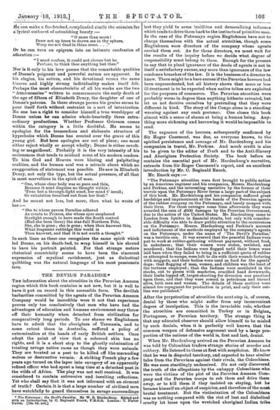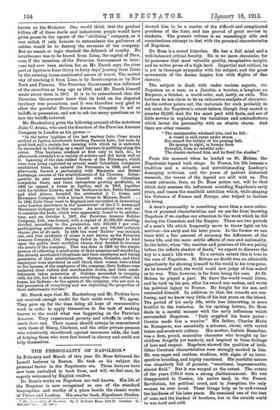THE DEVIL'S PARADISE.*
THE information about the atrocities in the Peruvian Amazon region which this book contains is not new, but it is well to have it put on record in this accessible form. The devilish barbarities committed by the agents of the Peruvian Amazon Company would be incredible were it not that experience proves only too conclusively that men who have had the advantages of education and humane environment may throw off their humanity When detached from civilization for comparatively long periods. To our shame we Englishmen have to admit that the aborigines of Tasmania, and to some extent those in Australia, suffered a policy of extermination at the hands of early British settlers. Once adopt the point of viewl that a coloured skin has no rights, and it is a short step to the ghastly culmination of treating savage native races as though they were animals. They are treated as a pest to be killed off like 'marauding wolves or destructive vermin: A striking French play .a few years ago turned on the lapse into savagery of an apparently refined officer Who had spent a long time at a detached poet in the wilds of Africa. The play was not well received. It was • considered to contain subversive and insulting reflections. Yet who shall say that it was nob informed with an element of truth ? Certain it is -that a large number of civilized men have watchfully to guard themselves in savage surroundings • The Pa-tawny° : the Deril's Parcidiee. By W. E. Hardenbing. Edited and with an Introduction by C. Reginald Enock, F.R.G.S. London: T. Fisher IInwin. [10e. 6d. net.]
lest they yield to some insidious arid demoralizing influence which tends to drive them baokto the instincts of primitive man. In the case of the Puturnayo region Englishmen have not to charge themselves with the actual atracities, though some Englishmen were directors of the company whose agents carried them out. As for these directors, we must wait for the results of the inquiry before we decide what degree of responsibility must belong to them. Enough for the present to say that to plead ignorance of the deeds of agents is not in itself a satisfactory excuse, any more than ignorance of the law condones breaches of the law. It is the business of a director to know. There might be a bare excuse if the Peruvian horrors had been unprecedented, but all history shows that more or less ill-treatment is to be expected when native tribes are exploited for the purposes of commerce. The Peruvian atrocities were probably worse in degree than anything hitherto revealed, but let us not deceive ourselves by pretending that they were different in kind. The story of the Congo alone is a standing warning against any such pretence. One closes this book almost with a sense of shame at being a human being. Any.. thing more sickening and harrowing it would be impossible to read.
The exposure of the horrors, subsequently confirmed by Sir Hoger Casement, Was due, as everyone knows, to the spirited persistence and courage of Mr. Hardenburg and his companion in travel, Mr. Perkins. And much credit is also
to be given to the editor of Truth and to the Anti-Slavery and Aborigines Protection Society. The book before us
contains the essential part of Mr. Hardenburg's narrative, extracts from Sir Roger Casement's reports and an excellent introduction by Mr. C. Reginald Enock.
Mr. Enock says :—
"The Putumayo atrocities were first brought to public notice by an American engineer and his companion, Messrs. Hardenburg and Perkins, and the interesting narrative by the former of their travels upon the Putumayo River forms a large part of the subject of this book. Mr. Hardenburg and his companion suffered great hardships and imprisonment at the hands of the Peruvian agents of the rubber company on the Putumayo, and barely escaped with their lives. For these outrages some time afterwards they were awarded the sum of .e.500 damages by the Peruvian Government, due to the action of the United States. Mr. Hardenburg came to London from Iquitos in financial straits, but only with considerable difficulty was able to draw public attention to the occurrences on the Pntumayo. Messrs. Hardenburg and Perkins's account and indictment of the methods employed by the company's agents on the Putumayo, under the name of The Devil's Paradise; was a terrible one. It was averred that the peaceful Indians wera pat to work at rubber-gathering without payment, without food, in nakedness ; that their women were stolen, ravished, and murdered ; that the Indians were flogged until their bones were laid bare when they failed to bring in a sufficient quota of rubber or attempted to escape, were left to die with their wounds festering with maggots, and their bodies were used as food for the agents' dogs: that flogging of men, women, and children was the least of the tortures employed ; that the Indians were mutilated in the stocks, cut to pieces with machetes, crucified head downwards, their limbs lopped off, target-shooting for diversion was practised upon them, and that they were soused in petroleum and burned alive, both men and women. The details of these matters were almost too repugnant for production in print, and only their outline was published."
After the perpetration of atrocities the next step is, of course, denial by those who might suffer from any inconvenient degree of inculpation. This is the invariable rule, whether
the atrocities are committed in Turkey or in Belgian, Portuguese, or Peruvian territory. The strange thing is that any educated observer should allow himself to be misled by such denials, when it is perfectly well known that the common weapon of defensive argument used by a large proportion of the nations of the world is, first and last; denial. When Mr. Hardenburg arrived on the Peruvian Amazon he was told by Colombian traders strange stories of murder and .robbery; He listened to these at first with scepticism. He knew that he was in disputed territory, and expected to hear sham- tales froth the Peruvians against their rivals, the Colombians. He Was soon startlingly undeceived. He not only discovered, the truth of the allegations by the unhappy Colombians vzho were the victims of the plot of the Peruvian Amazon Company and the Peruvian troops to rob them and drive them away, or to kill them if they insisted on staying, but he became himself an object of suspicion, and therefore of the most brutal treatment. But the victimization of the Colombians was as nothing compared with the riot of lust and diabolical cruelty let loose upon the wretched aboriginal Indian tribe
known as the Huitotos. One would think that the gradual killing off of these docile and industrious people would have given pause to the agents of the "civilizing" company, as it was called, if only because to exterminate the gatherers of rubber would be to destroy the revenues of the company. But no reason or logic checked the debauch of cruelty. No interference was to be feared from Lima, the capital of Peru, even if the intention of the Peruvian Government to intervene had ever been serious, for, as Mr. Enock says, the river port of Iquitos is from thirty to forty days' journey from Lima by the existing trans-continental means of travel. The easiest way of reaching it from Lima is by Southampton or by New York and Panama. The Peruvian Government was informed of the atrocities as long ago as 1906, and Mr. Enock himself wrote about them in 1907. It is to be remembered that the Peruvian Government knew that its hold on the disputed territory was precarious, and it was therefore very glad to allow the powerful Peruvian Amazon Company to act as bailiffs in possession, and not to ask too many questions as to how the bailiffs behaved.
Mr. Hardenburg gives the following account of the notorious Julio C. Arana, who used the directors of the Peruvian Amazon Company in London as his pawns :—
"In the latter 'eighties of the last Century Julio Cesar Arana arrived at Iquitos barefooted, hawking Panama hats ; but soon, by good luck and a certain low cunning with which he is endowed, he succeeded in building up a small business in peddling along the rivers. This business, confined at first only to hats, ecc., he afterwards extended to a variety of articles and did fairly well at it. Learning of the rich rubber forests of the Putumayo, which were then being exploited by several small Colombian companies established there, he entered the Putumayo in 1896, and soon afterwards formed a partnership with Benjamin and Rafael Larrafirtga, owners of the establishments of La Chorrera. Subsequently he also associated himself with other Colombian companies there, and these enterprises proving profitable, in 1898 he opened a house in Iquitos, and in 1903, together with his brother Lizard°, and his brothers-in-law, Pablo Zumaeta and Abel Alarco, founded the celebrated J. C. Arana and Hermanos Company, with a branch house in Manaos, Brazil. . . In 1905 Julio Cesar went to England and succeeded in interesting some London gentlemen in the possessions' of the J. C. Arana and Hermanos Company in this region. An accountant was sent out to examine the books which were apparently found to be satisfactory, and on October 1, 1907, the Peruvian Amazon Rubber Company, Ltd., was formed, with a capital of £1,000,000 sterling, divided, according to the prospectus, into 300,000 7 per cent. participating preference shares at .21 each and 700,000 ordinary shares, also at ..t1 each. In 1908 the word 'Rubber' was stricken out, and this syndicate of crime is now known as the Peruvian Amazon Company, Ltd. Having failed in their attempt to foist upon the public their worthless shares, they decided to increase the assets of the company. This was done in 1908 by the simple process of collecting a small army of their assassins and murdering the already mentioned Colombians and their employees and taking possession of their establishments. Serrano, Gonzalez, and their employees were murdered in cold blood, their women were added to the harems of the employees of the company, their Indians were enslaved, their rubber and merchandise stolen, and their establishments taken possession of. Ordofiez succeeded in escaping with his life, but had to abandon everything else—his rubber, his house, his Indians—to the agents of the company, who are now in full possession of everything and are exploiting the properties of their unfortunate victims."
Mr. Enock says that Mr. Hardenburg and Mr. Perkins have not received enough credit for their noble work. We agree. They gave up for the time being all hope of remunerative work in order to apply themselves to the task of making known to the world what was happening on the Peruvian Amazon. They experienced poverty and rebuffs in order to reach their end. Their names should always be remembered with those of Sharp, Clarkson, and the other private persons who voluntarily shouldered, against enormous odds, the task of helping those who were fast bound in slavery and could not help themselves.







































 Previous page
Previous page